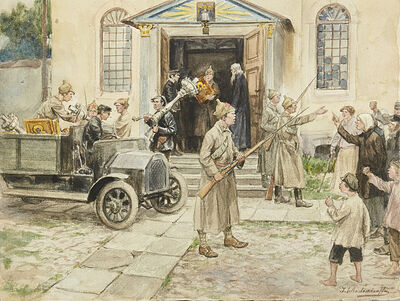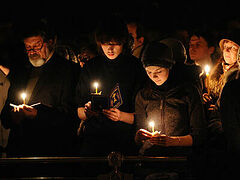The responsibility of a Christian in relation to God. The mutual relationship between a love for God, for one’s brother and for oneself. The indissoluble bond between love for God and love for one’s brother. The feeling of a child’s devotion as the basic Christian state of mind.
Rising from the lowest responsibility to the highest, we ascended to their pinnacle, to our responsibility in relation to God.
But a clear and exact commandment of the Holy Scriptures, the main responsibility of man in relation to God is love for Him. This love was commanded in the Old Testament where it was said, Then love the Lord, thy God with, all thine heart and with all thy soul, and with thy might (Deuteronomy 6:5). In the New Testament, the Lord Jesus Christ Himself said about this commandment that, This is the first and greatest commandment.
The Savior united a second commandment to this main commandment of God’s Law to love our brother as ourselves. He said that this commandment “resembles” the first commandment about loving God. The Holy Church, grounding itself upon these words of the Lord Himself, always established the following order in the moral responsibilities of man: the responsibility of man towards himself stands lowest of all. That is why man needs to sacrifice the love towards himself in the name of love towards God and his brother. Love towards one’s brother occupies a middle position. It rules over man’s love for himself but in its turn submits to the highest love, the love of’ man for God, Whom we must love most of all.
We can often hear remarks that a strong love of man for God harms and disturbs his love for his neighbor. That is why man (so say those who think thus), must think and care most of all about his responsibilities to his neighbors and thus fulfill his obligations in relation to God. People thinking and speaking from this point of view speak against the podvigs of a heremetical life especially. From their point of view, the life of a hermit is the expression of egotism, and not love towards others. A hermit, in their opinion is a man occupied exclusively with himself and the salvation of his soul and does not think about others at all.
There is some truth in this reasoning. It seems unlikely that anyone will argue against the fact that while serving their neighbor, a Christian also fulfills his responsibilities to God. More than that. According to the teaching of the Apostle of Love, St. John the Theologian, love towards one’s neighbor is an indicator of love for God… “If a man says he loves God and hates his brother he is a liar; for he who loves his brother whom he hath seen, how can he love God, Whom he hath not seen?” Not one Christian doubts that while being charitable towards our brother, we serve God by fulfilling His commandment of love.
However, it is even less doubtful that while loving God, we can ever harm our love for our brothers by our love for Him. God is love, (I John 18:16). By loving God, we transfer ourselves into a higher spiritual atmosphere—an atmosphere of love and a new “breath of life”. The heart of a Christian, filled with such divine love, sends love everywhere, turns its rays of Christian love upon everyone. In this way, contrary to the opinion which we cited above, man’s love for God not only does not hinder his love towards his brother but inversely, confirms and deepens it.
A wonderful explanation of the bond between the love of God and our brother is given by one of the ascetics of our Orthodox Church, Abba Dorotheus of Gaza. It is given in the following mathematical illustration:
In Circle A, the center is God and people are the surrounding points. The radii connect them with God and the arcs with each other. Here we see that people coming nearer to God through the radii, simultaneously come closer to each other inasmuch as the surrounding points near the center and the arcs connecting them become shorter. However, man can come closer to God and others only through love. It undoubtedly follows from this that by loving God, man will certainly also love his neighbor. Circle B shows us that Christian love for others brings man closer to loving God and brings him closer to loving other people.
Man through this comes nearer to God. Thus, these two kinds of Christian love are indissolubly and intimately tied to each other.
In the history of Christian ascetics, we continuously see how ascetics, blazing with love for God, left the world with its temptations. They did this by the commandment of the Apostle of Love, St. John the Theologian who said, Love not the world, neither the things that are in the world. If any man loves the world, the love of the Father is not in him. (I John 2:15). In vain it is thought that they renounced their love for people living in the world.
No, they themselves constantly indicated that they did not run away from people but from the sin that spilled over the world, from the temptations of a sinful worldly life. They loved their brothers, remaining in the world immeasurably more than those who lived in the world and participated in its sins. Let us not forget that the seclusion of these ascetics was always filled with prayer, and Christian prayer is not only for oneself but also for others. From the life of Righteous Pachomius the Great, born in the city of Alexandria, the following incident is known. Once, he found out that in Alexandria, his fatherland, hunger and epidemics were raging. Then, the saint spent three days in tears and left off eating what meager food he allowed himself. His disciples pleaded with him to strengthen himself with food, but St. Pachomius answered, “How can I eat when my brothers do not have bread…”. How far from such love and suffering are the very best of us!
The love of a Christian for God is not only the height of his moral ascension but also the basis of his spiritual being. Without love there cannot be and there are no spiritual life, podvigs, or virtue. The highest service of Christian love, the service of priesthood, can only exist in One who loves Christ. Not in vain did the Savior Himself, summoning Apostle Peter to preach, ask him, Simon, son of Jonas, lovest thou Me more than these? (John 21:15). Our religion is a religion of love. By this shall men know that ye are My disciples if ye have love one, to another! said the Lord. (John 13:35). Here, the discussion is not only about mutual Christian love of people for each other, but even more, about filial love and a child’s devotion to Him, Whom the Holy Gospel constantly calls, “Our Heavenly Father”. That is why the basis of a genuinely Christian life in man is a heart not only having faith in God but a child’s devotion to Him, penetrated by a sincere attraction to Him as towards a loving and beloved Father.








